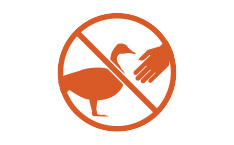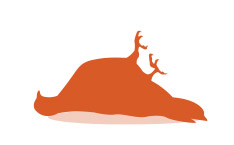
Avian Flu
Saint-Ours Canal National Historic Site
Avian Flu information
Since December 2021, the H5N1 strain of highly pathogenic avian influenza virus has been detected in multiple species of wild birds across Canada. This virus causes a contagious infection that particularly affects migratory species, including waterfowl (geese, snow geese, ducks) and birds of prey. However, it can affect all bird species and cause mass mortality events. A few cases have been reported along the Richelieu River and in the outskirts of Montréal.
Cases of human infection are possible through direct contact with a sick bird, but remain very rare. Nevertheless, it is recommended to pay attention to disinfection when you are in contact with birds, whether they are alive or dead.
Tips to prevent the spread of the virus
- Avoid touching and feeding wild birds with your hands.
- Avoid touching surfaces or objects heavily contaminated with bird droppings with your bare hands.
- Clean feeders and birdbaths frequently with a diluted solution of 10% bleach (9 parts water to 1 part bleach) and be sure to rinse thoroughly and let them dry.
- Recognize and report signs of avian flu.



Signs that a bird may have avian flu
- Nervousness, tremors or lack of coordination
- Swelling around the head, neck and eyes
- Neck often twisted or bent
- Lack of energy or weak movements
- Coughing, difficulty breathing or sneezing
- Diarrhoea
- Sudden death
- Decreased egg production or laying of soft-shelled or shell-less eggs
For pets
As with humans, it is uncommon for pets to contract the disease, although it remains a possibility.

- Keep an eye on your pets and avoid contact with dead birds. Keep your dog on a leash.
- Do you suspect that your pet has come into contact with a bird carcass? Give him a bath to limit the chances of spreading the virus.
- Pay attention to the symptoms that may develop in your pet and contact a veterinarian if necessary.
Report a sick or dead bird
Contact the Ministère des Forêts, de la Faune et des Parcs immediately at 1-877-346-6763.
- Date modified :